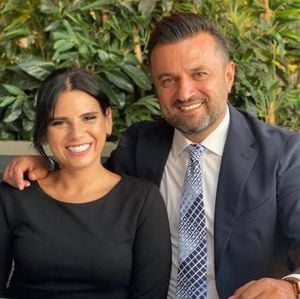On January 16, 2025, the University of Michigan announced the suspension of the Students Allied for Freedom and Equality (SAFE), its pro-Palestinian student organization, for two years. This unprecedented action has stirred considerable controversy amid rising tensions on U.S. campuses over the Israel-Hamas conflict.
SAFE faced charges for violating university policies during protests against the university's investments tied to Israel, marking the first suspension of its kind within the institution's history. According to university officials, SAFE's actions during two significant protests led to the decision. The first involved demonstrators outside the home of University Regent Sarah Hubbard last May; the second unfolded during the annual Festifall event aimed at showcasing student organizations.
Colleen Mastony, spokesperson for the university, stated, "Protests are welcome at U-M, so long as those protests do not infringe on the rights of others, significantly disrupt university events or operations, violate policies or threaten the safety of the community." The university's stringent approach reflects its stance on balancing free expression with the necessity for campus safety and order.
The charges arose amid intense scrutiny from both campus activists and university administrations following the devastating effects of the conflict sparked by Hamas's attacks on Israel on October 7, 2023. The escalation of violence has led to widespread protests across American universities, calling for the divestment of institutional funds from companies supporting Israeli actions during the Gaza conflict. Current estimates suggest the death toll of Palestinians has surpassed 47,000, according to health authorities.
SAFE has historically been one of the most vocal advocates for Palestinian rights at the university, aligning with the national organization Students for Justice in Palestine. The group asserts its protests are part of a larger movement aimed at raising awareness of Palestinian issues and calling for divestment from entities connected to Israeli policies.
"The university’s ploy to get us to stop just because of a ban and a ceasefire will not work," SAFE claimed via social media, framing the suspension as part of broader efforts to erode their message and presence on campus.
This tumultuous climate has been fueled by external pressures as well, including a recently established executive order by President Donald Trump aimed at combating antisemitism on college campuses. This order empowers schools to discipline students seen as sympathizing with Hamas, adding layers of complexity to how student protests are perceived and handled.
University officials have asserted they will not back down when it pertains to university standards. According to Hubbard, the protests at her residence "posed an obvious and serious threat or harm to a member of the university community." The administration indicated SAFE may appeal their suspension but would need to engage constructively with campus officials to address the university's concerns about misconduct.
This action has drawn criticism from various quarters, including Madison's Council on American-Islamic Relations, which accused the university of neglecting serious complaints of Islamophobia on campus. Advocates for SAFE and similar groups argue they are being disproportionately targeted amid rising hostility against pro-Palestinian protests.
During the suspension, SAFE will be unable to access university spaces or funding, restricting its ability to mobilize and organize on campus. If the organization can demonstrate compliance with university policies and engage positively with university officials, the suspension could potentially be lifted earlier than the designated term.
Students involved with SAFE assert this measure is not merely punitive but reflects broader societal fractures concerning free speech, activism, and institutional responses to political expression. Critics of the university's decision argue it undermines academic freedom at the university, with some calling it censorship disguised as policy enforcement.
With tensions still high following months of conflict and protest, the fate of SAFE remains uncertain. The ultimate outcome will likely hinge on the political climate surrounding the Israel-Palestine issue and the prevailing attitudes of university administrations across the country.



